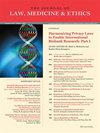人工智能和数据监测:嵌入基于人权的方法。
IF 1.7
4区 哲学
Q2 ETHICS
Journal of Law Medicine & Ethics
Pub Date : 2025-01-01
Epub Date: 2025-04-14
DOI:10.1017/jme.2025.17
引用次数: 0
摘要
人工智能(AI)有可能通过分析大型数据集来检测疫情,从而彻底改变公共卫生监测。然而,隐私、同意和治理问题仍然存在。虽然《国际卫生条例》没有明确提到在传染病监测中使用人工智能,但透明的程序、问责制和公众信任是负责任地将人工智能纳入大流行防范工作的关键。本文章由计算机程序翻译,如有差异,请以英文原文为准。
AI and Data Surveillance: Embedding a Human Rights-based Approach.
Artificial Intelligence (AI) has the potential to revolutionize public health surveillance by analyzing large datasets to detect outbreaks. However, privacy, consent, and governance issues persist. While the International Health Regulations do not explicitly mention the use of AI in infectious disease surveillance, transparent processes, accountability, and public trust are key for responsibly integrating AI in pandemic preparedness.
求助全文
通过发布文献求助,成功后即可免费获取论文全文。
去求助
来源期刊

Journal of Law Medicine & Ethics
医学-医学:法
CiteScore
2.90
自引率
4.80%
发文量
70
审稿时长
6-12 weeks
期刊介绍:
Material published in The Journal of Law, Medicine & Ethics (JLME) contributes to the educational mission of The American Society of Law, Medicine & Ethics, covering public health, health disparities, patient safety and quality of care, and biomedical science and research. It provides articles on such timely topics as health care quality and access, managed care, pain relief, genetics, child/maternal health, reproductive health, informed consent, assisted dying, ethics committees, HIV/AIDS, and public health. Symposium issues review significant policy developments, health law court decisions, and books.
 求助内容:
求助内容: 应助结果提醒方式:
应助结果提醒方式:


